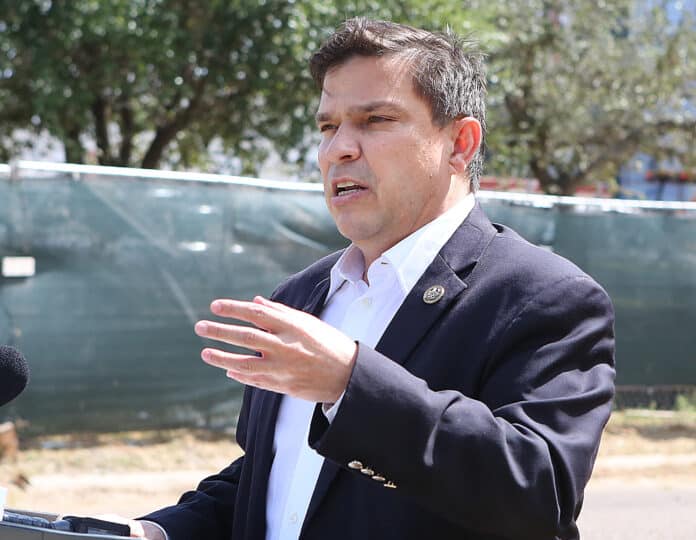
U.S. Rep. Vicente Gonzalez on Thursday announced the re-introduction of a bill that would provide a pathway to citizenship for deported veterans.
The Repatriate Our Patriots Act, or ROPA, was introduced by Gonzalez, D-McAllen, and U.S. Rep. Don Young, R-Alaska. The bill aims to help bring back deported veterans who were honorably discharged from the military.
“Many of them, as you know, come home with PTSD, and there’s a high level of alcohol and drug abuse, or sometimes they may get into some kind of physical altercation, and the next thing you know they find themselves deported,” Gonzalez said. “I started this push since I arrived in Congress, and I actually had a conversation with President (Donald) Trump about it at the time, which he also opposed the deportation of veterans, but nothing was really done.”
Gonzalez said that enough noise has been made about the issue of deported veterans, and he believes that the President Joe Biden and his administration will be the first to create a pathway home for deported veterans from whichever country they were sent.
The congressman also hopes for the creation of a policy designed to halt the deportation of American veterans.
“Up until now, that wasn’t even a question that was asked — if they were U.S. citizens or not,” Gonzalez said. “Because of that, we don’t know the exact numbers, but I can say there are thousands of them. We have records of them in 38 countries around the world. It’s not a question that they ask upon deportation, whether you’ve served in the military or not. Hopefully that is a question that will now be asked.”
Gonzalez added that the veterans who have been deported were all in the country legally. He explained that they had legal status, but they were not American citizens. He said that many of the veterans who were deported are decorated combat veterans who came home and battled PTSD.
This would be Gonzalez and Young’s third attempt at passing the bill, the first being during his first term in Congress in 2018. He said he feels confident this time around, and that the bill is already garnering bipartisan support.
Gonzalez plans to present the bill to the 56-member Problem Solvers Caucus, of which he is a member of, to gain more support.
“These are just members of Congress who oppose deporting somebody who’s put on a uniform and fought for our freedom,” Gonzalez said. “It’s a bipartisan group. I think we need to codify it and make it permanent law to ensure that all future administrations will have to abide by this same law.”
Regarding veteran deportation as an ongoing issue, Gonzalez laid blame on both parties and several administrations, saying the group has gone largely “unnoticed.”
“I can’t think of anything more appalling and shameful than to deport an American veteran,” he added.
There is currently another similar bill in the U.S. Senate, SB 2265, which was sponsored by U.S. Sen. Tammy Duckworth, that will establish a veterans’ visa program to allow deported veterans to return to the U.S. as immigrants.
“It doesn’t matter to me which (bill) gets through, but we need to get this converted into law and ensure that we have a permanent law in our country to prevent the deportation of any future veterans,” Gonzalez said.
CHILD TAX CREDIT
The congressman also announced the launch of the Child Tax Credit, which will begin Friday. Parents with children will be receiving a check every month per child through the end of the year.
Parents of children between 5 and 17 years old will be receiving $250 per child, and a $300 check for children under the age of 5.
“This will qualify 94.5% of all children in my congressional district,” Gonzalez said. “It should bring about half the children in poverty out of poverty. This will be a great final push and benefit as we’re coming out of the pandemic and our economy’s completely opening.”
To qualify for the Child Tax Credit, single parents must be earning $75,000 or less. Married parents with the head of household must be earning less than $112,500. Parents who file taxes jointly must earn less than $150,000 to qualify.
Non-tax filers should visit irs.gov/childtaxcredit2021 and register their children in order to begin receiving the tax credit.




